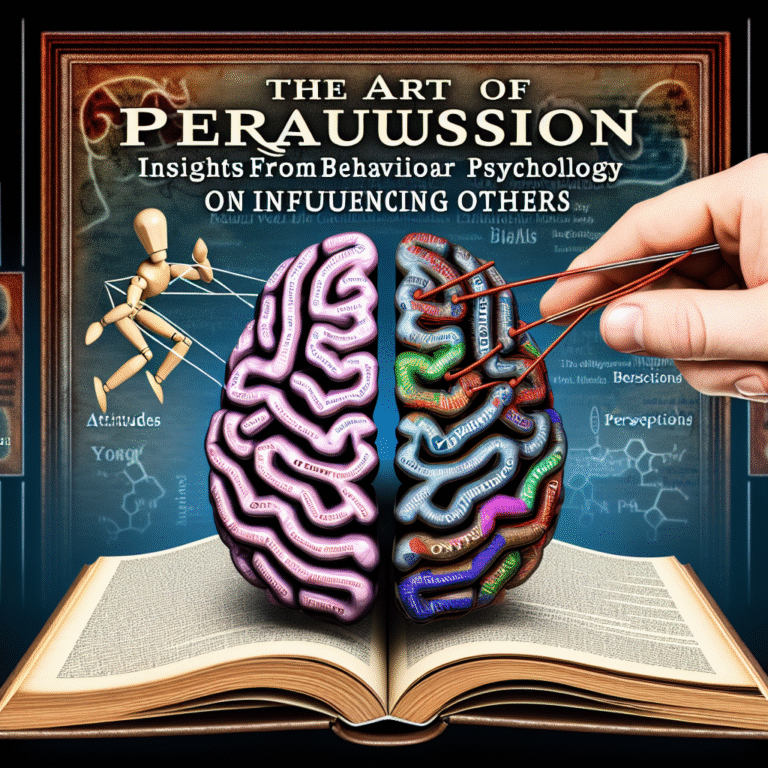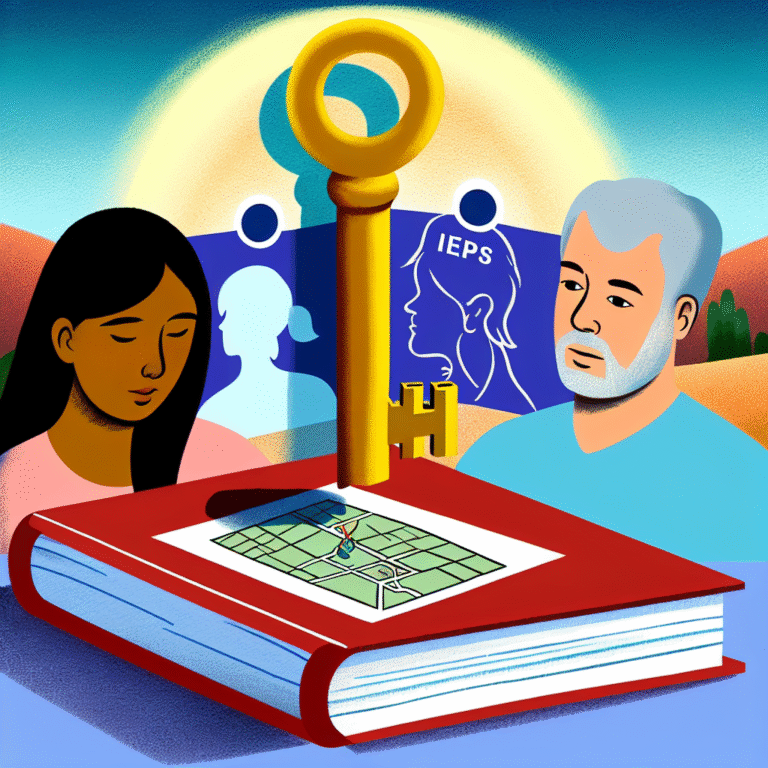
Behavioral Psychology Unveiled: Essential Insights into Human Behavior and Change
Introduction: The Intrigue of Human Behavior
Have you ever wondered why we behave the way we do? What drives us to make decisions, form habits, and ultimately change our lives? In the dynamic field of behavioral psychology, professionals strive to untangle the intricate web of human behavior, offering insights that can empower individuals to enact meaningful change in their lives. Behavioral Psychology Unveiled: Insights into Human Behavior and Change takes us on an enlightening journey through the principles, theories, and real-world applications of this fascinating discipline. As we delve into this topic, we will uncover powerful strategies to understand ourselves and navigate the complexities of our behavior.
The Essence of Behavioral Psychology
Behavioral psychology, also known as behaviorism, focuses on observable behaviors and the ways in which they are learned and reinforced. Pioneers in the field, like B.F. Skinner and John Watson, emphasized the role of the environment in shaping behavior, positing that individuals are largely products of their surroundings, experiences, and interactions. This perspective challenges the introspective methods of traditional psychology, advocating for a more empirical approach to understanding behavior.
Key Concepts and Theories
To understand Behavioral Psychology Unveiled: Insights into Human Behavior and Change, it’s essential to explore key concepts, such as:
Classical Conditioning: Introduced by Ivan Pavlov, this concept explains how we learn to associate stimuli with responses. Pavlov’s famous dog experiments illustrated how a neutral stimulus (a bell) could elicit a conditioned response (salivating) when paired with an unconditioned stimulus (food).
Operant Conditioning: B.F. Skinner expanded on classical conditioning by showing how behaviors could be reinforced or punished. This understanding has profound implications for habit formation and behavior modification.
- Behavior Modification Techniques: Applications of behavioral psychology, such as token economies and systematic desensitization, can effectively alter problematic behaviors and foster positive change.
Through these foundational theories, behavioral psychology equips us with essential tools to decode our actions and instigate change. By grasping these concepts, we begin to appreciate the mechanisms behind motivation, decision-making, and ultimately, behavior change.
The Role of Reinforcement in Behavior Change
When discussing Behavioral Psychology Unveiled: Insights into Human Behavior and Change, we cannot overlook the significant impact of reinforcement. Reinforcers can be positive or negative but serve the same purpose: increasing the likelihood of a desired behavior.
| Type of Reinforcement | Description | Example |
|---|---|---|
| Positive Reinforcement | Introducing a pleasant stimulus to encourage behavior | Giving praise for a job well-done |
| Negative Reinforcement | Removing an unpleasant stimulus to encourage behavior | Ending discomfort when a task is completed |
| Positive Punishment | Introducing an unpleasant stimulus to deter behavior | Receiving a fine for littering |
| Negative Punishment | Removing a pleasant stimulus to deter behavior | Taking away privileges for misbehavior |
Through the strategic application of reinforcement techniques, individuals and therapists can inspire profound behavioral shifts. For instance, a case study involving a school-wide positive reinforcement program demonstrated how targeted rewards for good behavior led to a 40% decrease in disciplinary actions over one academic year.
Case Study: The Impact of Positive Reinforcement in Schools
A prominent case study in Behavioral Psychology Unveiled: Insights into Human Behavior and Change illustrates the power of reinforcement. At Cedar Grove Elementary, educators implemented a token economy system where students earned tokens for exhibiting positive behaviors (such as participating in class or helping peers). These tokens could be exchanged for fun activities or treats. The results were astounding: not only did behavioral infractions decrease significantly, but students also reported a greater feeling of community and engagement in their learning environment.
The Power of Habit and Behavioral Change
Understanding habits is critical in exploring Behavioral Psychology Unveiled: Insights into Human Behavior and Change. Our daily routines are largely dictated by habits—automatic behaviors acquired through consistent reinforcement. The habit loop consists of three components: the cue (trigger), the routine (behavior), and the reward (reinforcement). Recognizing this loop enables individuals to modify their habits effectively.
Case Study: The Habit Loop and Weight Loss
A compelling case study involves a group of overweight individuals attempting to lose weight through the principles of the habit loop. By identifying cues that triggered unhealthy eating (such as stress), they replaced the routine (snacking) with a healthier behavior (going for a walk) that provided a similar reward (endorphin release and stress relief). Not only did participants lose weight, but many reported a drastic improvement in mood and self-esteem. This illustrates the interconnectedness of habits and emotional well-being within the framework of Behavioral Psychology Unveiled: Insights into Human Behavior and Change.
Overcoming Resistance to Change
One of the most profound insights from Behavioral Psychology Unveiled: Insights into Human Behavior and Change is recognizing the barriers that impede change. Cognitive dissonance, a psychological phenomenon where our beliefs and behaviors clash, can cause significant resistance when attempting to alter unhelpful patterns.
Strategies to Combat Resistance
Awareness and Acceptance: Recognizing the discomfort of cognitive dissonance can be empowering. By accepting these feelings, individuals can better navigate the complexities of change.
Small Steps Approach: Rather than overwhelming ourselves with drastic changes, breaking goals into manageable steps can foster a sense of achievement and encourage perseverance.
- Social Support: Engaging with others can help mitigate feelings of resistance. Studies show that individuals who share their goals with supportive friends or family experience greater success in behavior change.
A case study highlighting a weight-loss support group showed that members who regularly attended meetings were not only more successful in achieving their goals, but they also reported higher levels of motivation and commitment. This reinforces the value of community in fostering sustainable change, a critical insight from Behavioral Psychology Unveiled: Insights into Human Behavior and Change.
The Influence of Environment on Behavior
The environment plays a pivotal role in shaping behavior, as emphasized by Behavioral Psychology Unveiled: Insights into Human Behavior and Change. A carefully structured environment can nudge individuals toward positive behaviors while minimizing the temptation to revert to negative ones.
The Nudge Theory
Nudge theory, popularized by Richard Thaler, suggests that small changes in the environment can lead to significant changes in behavior. For example, making healthy food options more accessible in school cafeterias can promote better dietary choices among students.
Case Study: Nudge Theory in Action
A compelling application of nudge theory occurred in a corporate setting, where leaders aimed to encourage employees to take the stairs instead of the elevator. By positioning motivational signs near stairwells and making the stairway visually appealing, employee stair usage doubled within a month. This simple yet effective intervention highlights how environmental modification aligns with insights from Behavioral Psychology Unveiled: Insights into Human Behavior and Change.
Real-World Applications of Behavioral Psychology
The principles derived from behavioral psychology offer actionable insights across various domains, including mental health, education, business, and personal growth. Below are some notable applications:
Therapeutic Practices: Techniques such as cognitive behavioral therapy (CBT) utilize behavioral insights to address anxiety and depression by transforming negative thought patterns and maladaptive behaviors.
Education: Educators can leverage behaviorist strategies to foster a positive learning environment. Implementing clear expectations and rewards can elevate student engagement and performance.
- Workplace Behavior Management: Organizations can utilize behavioral strategies to enhance productivity and job satisfaction. Understanding employee motivation through reinforcement and recognition can cultivate a thriving workplace culture.
Conclusion: The Path Forward
As we conclude our exploration of Behavioral Psychology Unveiled: Insights into Human Behavior and Change, it becomes clear that understanding the principles of behavioral psychology is not merely academic; it is profoundly practical. The insights we’ve uncovered empower us to instigate real change not only in ourselves but also in those around us. By applying robust behavioral strategies, we can navigate our capabilities, foster healthier habits, and realize our goals with confidence.
The path to transformation is never linear, but with the insights gleaned from behavioral psychology, we are equipped with the knowledge to face obstacles head-on. Change is possible when we take small, deliberate steps, reinforced by supportive environments and communities.
FAQs
What is the primary focus of behavioral psychology?
Behavioral psychology primarily focuses on observable behaviors rather than internal mental processes, emphasizing the impact of the environment on behavior formulation.How can behavioral psychology be applied to personal development?
Behavioral psychology can be applied to personal development through techniques such as habit formation, reinforcement strategies, and overcoming cognitive dissonance.What are some effective behavior modification techniques?
Effective behavior modification techniques include positive reinforcement, token economies, and systematic desensitization to alter unwanted behaviors.How does social support influence behavior change?
Social support serves as a motivator and facilitator for behavior change by providing encouragement, accountability, and shared experiences that enhance commitment.- Why is understanding the environment important for behavior change?
Understanding the environment is crucial as it shapes behaviors. Modifying environmental cues and contexts can effectively nudge individuals toward desired actions and choices.
By incorporating these insights and strategies into our daily lives, we deepen our understanding of human behavior and lay the groundwork for lasting change. The exploration of behavioral psychology is more than an academic endeavor—it’s a powerful toolkit for transformation.














